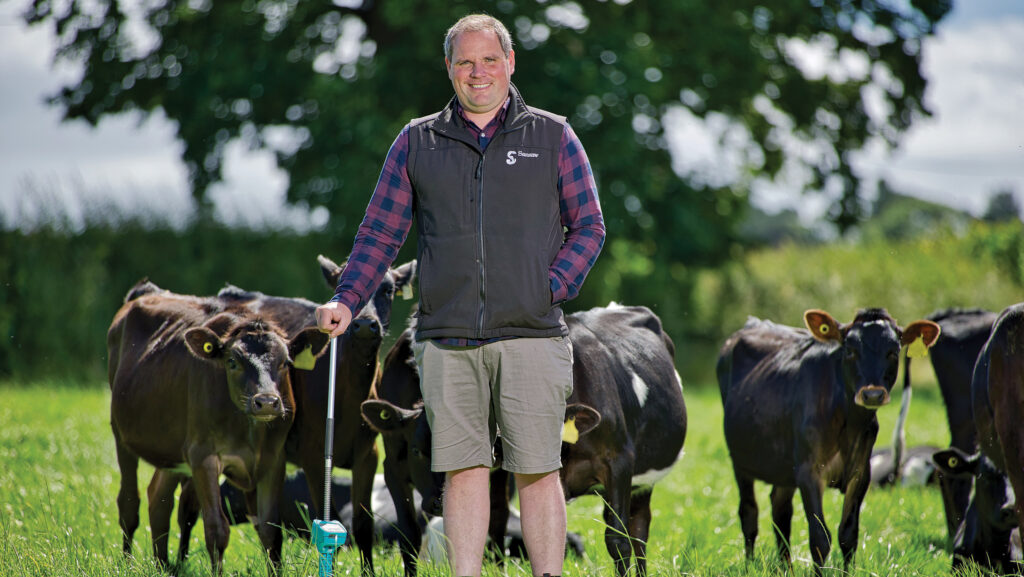Grass-based dairy sees progress on herd and environment
 © Richard Stanton
© Richard Stanton Calving was faster than ever this year at Sansaw Dairy in Shropshire, run by Breiffni Daly, the 2024 Farm Manager of the Year.
The first four weeks from early February saw 1,130 of the 1,520 head calved.
One of Breiffni’s many targets when he took the job in 2020 was to increase milk yields and further progress has been made on this front since the Farmers Weekly Awards judging visit last summer.
The herd’s overall average yield in the year ending December 2024 was 4,950 litres, up from 4,800 litres in July 2024.
See also: Farmers Weekly Awards – 2024 farm manager of the year
Milk from forage
Eighty per cent of milk is produced from forage and the third to eighth lactation portion of the herd is now achieving 540kg of milk solids a year, off an average yield of 5,431 litres.
The herd’s breeding is a mix of New Zealand Friesian, Irish Friesian and Jersey.
It is a relatively young herd, compared with the 1,200 head in place when Breiffni took over as manager five years ago.
Historical issues mean that replacement rates have been high.
“We are on top of those issues now – a lot of poor-performing cows have been culled and herd genetics are getting better,” says Breiffni.
“Going forward, we will only keep 400 R1s and R2s.”
Farm facts
- 820ha grass-based dairy
- 1,520 cows in herd
- 1,000 beef calves (3-6 months)
- 14 full-timers, nine more at calving
- 190 paddocks
- 4.98% butterfat, 3.82% protein
- Top milk hygiene band
This is in contrast to the past two years, which have seen 500 R1 and R2 heifers (those under a year and in their second year respectively) kept.
Changing the herd structure had been under consideration, to possibly split out an autumn-calving block to balance the impact of seasonality on milk income, but the decision has been made not to do this.
“This month is key. We will push to get as much milk out in April, May and June,” says Breiffni.
“Last year, we fed the cows extremely well and got the benefit in more milk.
“Although the seasonality penalty costs us about 2p/litre, it’s something we can take.
“We need the cows to peak to get those extra litres and then get as much milk as we can in September, October and November.”
A kinder autumn in 2024 saw the cows out on the grazing platform for longer, and then outwintered and moved onto fodder beet and baled silage for their dry period.
Recruitment plans
Breiffni will be advertising two full-time roles in the near future to replace staff who are moving on from the team of 14 permanent staff.
He’s looking for people with at least three years’ experience and bags of enthusiasm.
“They will need a passion for dairy grazing, animal welfare, cow health and for milking,” he says.
Managing winter transition
Managing the transition to fodder beet takes skill, says Breiffni.
“The cows are going from zero to 10kg of fodder beet a day within a two-week period.
“It’s quite a skill to overwinter so many cows and it’s easy to underestimate that – cows can easily be lost. We do it in five batches of 200 cows.”
The farm relies on contractors for field work and silage.
A decent financial performance this milk year, and a good six to eight month milk price outlook will enable investment in a slurry tanker with a dribble bar and replacement of the loadall and a tractor.
The farm now has a Countryside Stewardship Mid Tier agreement, including 1.8km of hedge planting, fencing off streams and other watercourses to create buffer zones.
The acreage of herbal leys will be increased, and more clover will come into the sward.
Breiffni has introduced many protocols to ensure high and consistent standards.
Suggestions from the team have led to labelling up controls for the backing gate and the installation of a tap by the foot-bath.
“It’s a huge team effort always on Sansaw, and we have a great team,” says Breiffni.
“I’m lucky to have them all working alongside me every day.”
Following a suggestion from one of this year’s students, freeze branding will be introduced to help with pedometer management.
Staff also attend a range of dairy and grass discussion groups, while training on foot-trimming and artificial insemination is planned.
The 2025 Farmers Weekly Awards

The 2025 Farmers Weekly Farm Manager of the Year Award is sponsored by Safety Revolution.
Enter or nominate at fwi.co.uk/awards25
